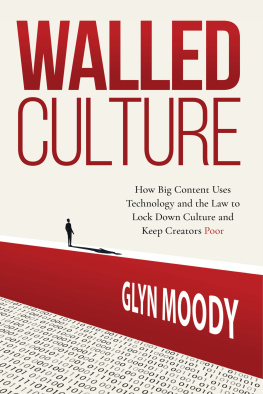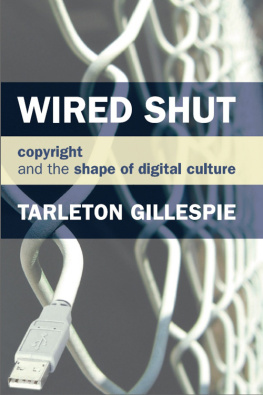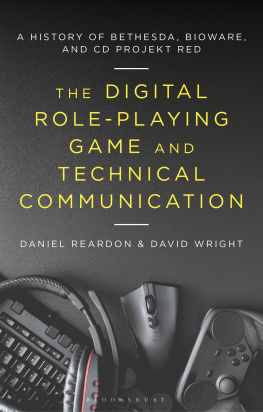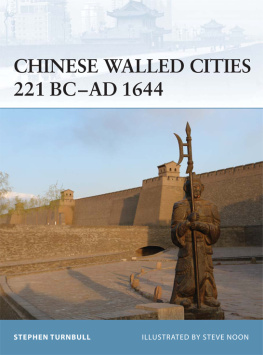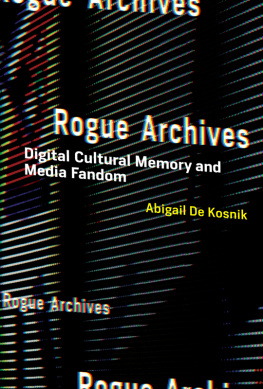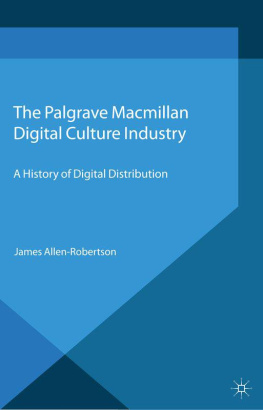

ALSO BY GLYN MOODY
Rebel Code
Digital Code of Life

How Big Content Uses Technology and the Law
to Lock Down Culture and Keep Creators Poor
Glyn Moody

Walled Culture:
How Big Content Uses Technology and the Law to
Lock Down Culture and Keep Creators Poor
978-946459495-9 (paperback)
978-946459849-0 (eBook)
Published by BTF Press, 2022
This worked is licensed under a Creative Commons CC0
1.0 Universal (CC0 1.0) Public Domain Dedication license.
To my family.

Contents
Chapter 1. From Analogue to Digital
Big Contents plan to take total control online
Chapter 2. Hostage Works and Vanishing Ebooks
Publishers sue Google and the Internet Archive for sharing knowledge and culture
Chapter 3. Aaron Swartzs Manifesto
Making all publicly funded research freely available through open access
Chapter 4. Internet Users at Risk
Napster, three strikes and the Great Internet Blackout
Chapter 5. From Scare Tactics to Censorship
Big Contents wrongful takedowns and Web site blocking
Chapter 6. How the European Union Passed Copyrights Worst New Law
Spying on the Internet with upload filters
Chapter 7. Digital Monopolies
Relentless lobbying plus regulatory capture leave artists and the public powerless
Chapter 8. Copyright Absurdities
Disobedient computers, rotting films, and Katy Perrys battle over an ostinato
Chapter 9. True Fans Are the Real Solution
Helping creators and culture thrive without Big Content

Foreword
Tragically, the internet is turning from our dreams of a more democratic and open publishing system to one that is increasingly controlled by a shrinking number of international corporations. These corporations, publishers as much as tech companies, are using the connected nature of our technologies to assert new controls that were never possible in the analog era. What is happening? And what can we do to get back on track?
Many of us have spent our careers building toward a decentralized Great Library, where the published works of humankind would be available to those curious enough to want access. Further, this Library would be inclusive of all voices as everyone would have the opportunity to share their works and many would get enough readership to earn a living. New computer and network technologies would help everyone to sort through the vast troves of information. We have made progress, but we have had setbacks.
The internet now connects most people around the world, but countries are starting to block access. Server technology, once very distributed, is becoming more concentrated in a few companies cloud services.
But maybe the most alarming is the assertion of unprecedented control by multinational media conglomerates leveraging the connected nature of the internet. Some publishers and technology companies will not sell digital publications, but continue to keep control through long tentacles afforded by a combination of licenses and digital rights management technologies. This could mean that libraries and individuals may never own books and other works in our digital age making every reading event a permissioned event by some remote and massive corporation.
A future where corporations can say exactly who can read what, when, and for how long, and changing what can be read at any time, can sound like a dystopian science fiction story but it is starting to happen now. This book comes out at an important time a time where we can still change what happens.
I am so glad this book is being published, and published openly; it will help us build strong institutions to counter the dystopian impulses of some organizations and build an information ecosystem that has many winners, many voices, and much to celebrate.
Brewster Kahle
July 2022
San Francisco

CHAPTER 1
From Analogue to Digital
Big Contents plan to take total control online
The modern world is digital. We meet people online, we pay for things online, we deal with the government online. But the digital sphere is not just the latest version of the traditional, analogue world. It is fundamentally different. The transition from an analogue world to a digital one is a step change; in any civilisations history, it only happens once. This book is about what happens when one aspect of the analogue pastcopyrightresists and fights against the digital future, as represented by the Internet.
Copyright was born 300 years ago in a world that was analogue but unaware of it. It could take for granted the fact that making copies of material was slow if done by hand, and expensive and complicated if done with a machine such as a printing press. This made policing copyright straightforward: just arrest the copier and confiscate the equipment.
Copyright for books seemed to work well and so was extended. First, in terms of reach to other forms of material such as music, maps and drawings, and subsequently, as regards its duration. The initial term of modern copyright, drawn in 1710, granted state-backed protection to an author for fourteen years, renewable to twenty-eight years. When the young United States of America drew up its own copyright law in 1790, it adopted a similar twenty-eight-year term. In 1831, copyright term in the United States was extended to forty-two years and then in 1909 to fifty-six years. By the time of most recent US copyright act, copyright term had reached life of the author plus seventy years and hence there is typically more than one hundred years of government protection.
At the same time, similar copyright laws were passed around the world and a common framework for them was established in 1886 under the Berne Convention, which was updated over the next century. A key feature of the Berne Convention is that it sets minimum standards for copyright laws for the signatory countries. One of which is that the term of copyright must be at least the duration of the creators lifetime plus fifty years. Another aspect of the treaty, which is arguably even more far-reaching, is that copyright arises with the creation of a work. Hence it does not require any formalities, such as a registration process. The measures effectively baked copyright into all acts of creativity as soon as they are written down, recorded, or entered into a computersomething that always takes place and cannot be easily turned off.
Removing formalities was an important change for US law: for example, when the United States acceded to the Berne Convention in 1989or to go through an additional registration process in order to qualify for copyright protectionit was just automatic. For the public, it was an irrelevance that things such as their handwritten messages or photos of friends and family were now covered by copyright because there was no easy way to make a copy of them anyway.
Next page
